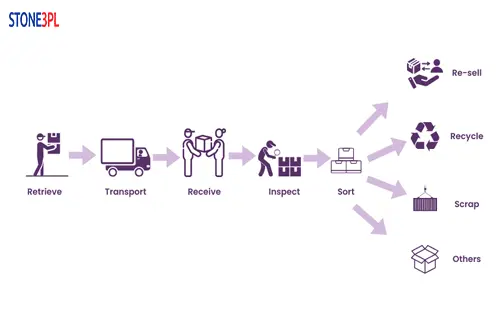Help E-commerce Sellers Solve Problems in Reverse Logistics
Are you still worried about the complicated or slow return process affecting customer experience? Are you at a loss in the face of high reverse logistics processing costs and the need to effectively manage a large number of returned goods? Returns not only mean a loss of sales, but also pose a threat to brand image and customer satisfaction. How to reduce returns and optimize logistics experience through professional services.

What is Reverse Logistics?
Reverse Logistics refers to the process of returning unqualified products, returns, repairs, etc. from consumers to manufacturers or logistics centers. Unlike traditional logistics that focus on the forward flow of goods, reverse logistics deals with the backward flow of goods.
Return troubles: a common problem for companies and e-commerce sellers
Have you also encountered such a problem: customers are not satisfied with the goods after receiving them and ask for a return; or because of damage during the logistics process, the goods cannot be used normally. Due to transportation, replenishment and processing costs, the cost of processing returns can be high. Faced with these troubles, are you also looking for effective solutions?
Scope of reverse logistics
Product returns: handling customer returns due to defects, dissatisfaction or wrong orders.
Repair service: Products need to be repaired or parts replaced, and defective products are returned for repair or refurbishment before resale.
Seasonal inventory adjustment: The handling of seasonal goods after they are removed from the shelves.
Product recall: Effectively recall defective or unsafe products to prevent harm and comply with regulations.
What are the roles of reverse logistics?
Enhance customer trust: Provide a worry-free return policy.
Reduce waste: Reduce resource waste through reuse and recycling.
Enhance brand image: Show the company's sense of responsibility and professionalism.
Inspection and classification: Evaluate returned items to determine their condition and take appropriate measures.
Replenishment and redistribution: Reintegrate returned items into inventory for resale or redistribution.
Disposal and recycling: Dispose of or recycle unsaleable items in an environmentally friendly manner.
Reverse logistics covers a variety of situations such as returns, repairs, and recalls. Through reverse logistics, companies can promptly understand product quality issues and optimize product design; at the same time, they can also improve customer satisfaction and enhance brand loyalty. In addition, reverse logistics also helps companies reduce inventory costs and improve operational efficiency.
Measures and solutions to reduce returns
Accurate product descriptions
Provide detailed and accurate product descriptions and images to set correct customer expectations and reduce returns due to misunderstandings.
High-quality product images and videos
Give consumers a more comprehensive understanding of the product, ensure that the product meets consumer needs, and reduce returns due to quality issues. Implement strict quality control measures to reduce the possibility of defective products reaching customers.
Optimize shopping experience
Provide detailed product information, clear shopping process and high-quality customer service to reduce returns due to misunderstandings or poor communication.
Improve packaging
Strengthen logistics and product packaging management to ensure that the goods are not damaged during transportation and reduce returns due to logistics problems.
Flexible return policy
Provide a convenient return process to reduce customer dissatisfaction.
Customer support
Provide high-quality customer support, solve problems in a timely manner and reduce unnecessary returns.
Size guide and reviews
Provide a comprehensive size guide and encourage customer reviews to help buyers make informed decisions.
How can return management services help companies reduce costs?
Optimize the return process: simplify the process, reduce time waste and additional costs.
Data analysis: Analyze the reasons for returns and optimize products and supply chains.
Inventory consolidation: Effectively manage returned goods and consolidate inventory.
Resale and recycling: Put returned goods back into the market or recycle them.
Reduce environmental impact: Implement sustainable practices to reduce waste and promote recycling.
Enhance customer experience: Provide a smooth and easy return process to improve customer satisfaction and loyalty.
Through professional reverse logistics services and return management services, companies can effectively reduce return costs. On the one hand, professional service providers can provide fast and accurate return processing processes to reduce the operating costs of enterprises; on the other hand, service providers can also provide professional data analysis services to help companies understand the reasons for returns, so as to optimize product design, shopping experience and logistics and transportation management in a targeted manner.
As a freight service provider around you, Stone3PL provides not only transportation services, but also comprehensive Reverse Logistics Solutions. Through reverse logistics, we can effectively manage returns, improve customer satisfaction and reduce operating costs.
